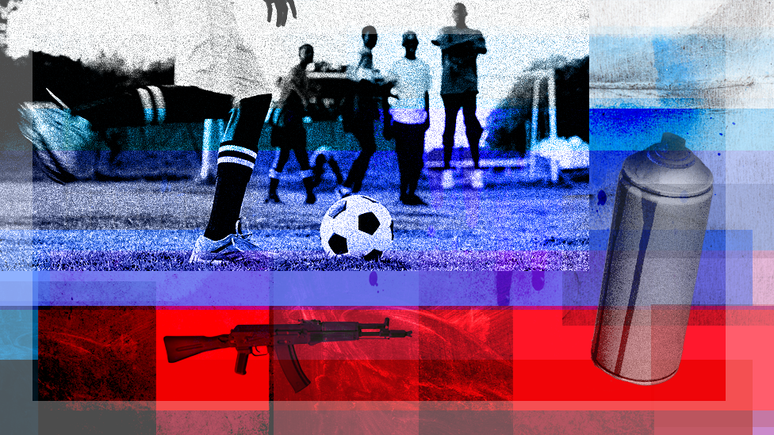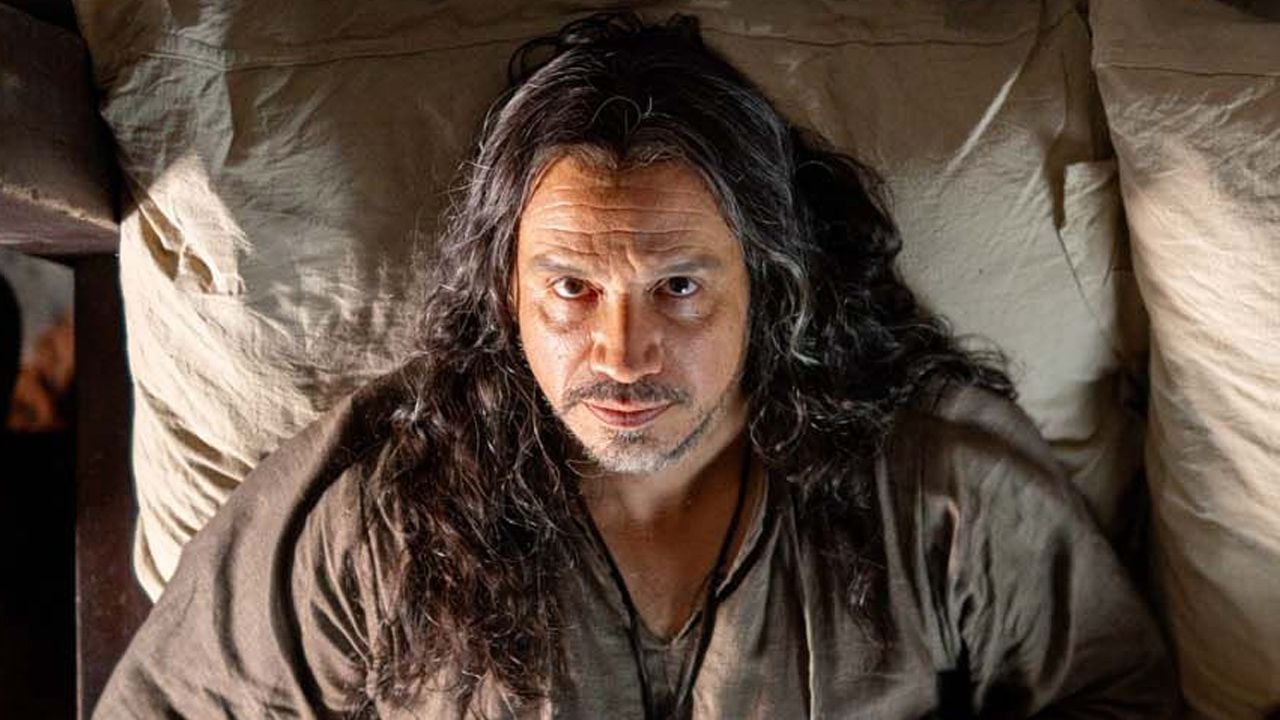Russia is increasing its influence on the continent through the African Initiative, which spreads misleading claims online and promotes Russian culture locally.
Teenage soccer players listen to the Russian national anthem before a match. Nearby, artists paint a portrait of Russian President Vladimir Putin on a wall during a graffiti festival.
Welcome to Burkina Faso, one of the African nations where Russia is strengthening its operations to gain influence.
Evidence found by the BBC shows that Russia is using cultural and media initiatives to attract African journalists, influencers and students, while spreading misleading information.
These events are being promoted by the African Initiative, a newly founded Russian media organization that describes itself as an “information bridge between Russia and Africa.” It inherited the structures previously created by the dismantled Wagner mercenary group, which experts believe is linked to Russian security services.
Registered in September 2023, a month after Wagner leader Yevgeny Prigozhin died in a plane crash, the African Initiative incorporated former employees of Prigozhin’s mercenary group and disbanded companies.
His initiatives have focused in particular on the military regimes of Mali, Niger and Burkina Faso in the Sahel.
Following recent coups, these countries have distanced themselves from Western allies like France, criticizing their failed interventions against jihadist groups and colonial legacies. They have instead turned to Russia.
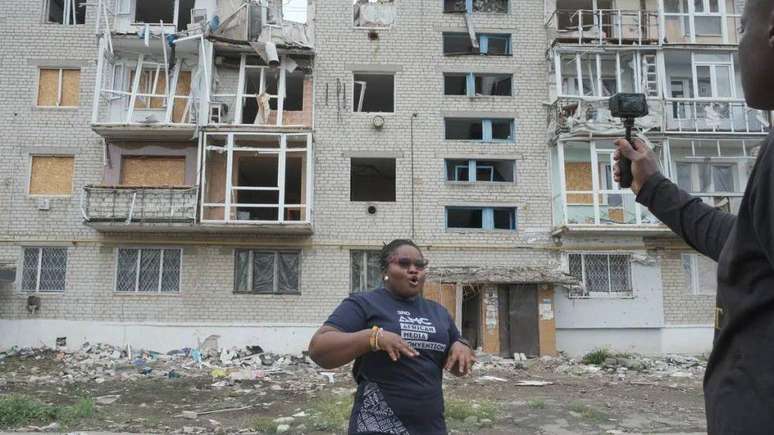
In parallel with local cultural events, the African Initiative maintains a news website with articles in Russian, English, French and Arabic, as well as a video channel and five Telegram channels, one of which has nearly 60 thousand subscribers.
Some Telegram channels were “recycled” from older ones created by Prigozhin’s company. They were the first to promote the Russian Defense Ministry’s paramilitary group, the Africa Corps, which effectively replaced Wagner’s military wing in West Africa.
There is no shortage of pro-Kremlin narratives and misleading information, especially regarding the United States.
Articles published on the Africa Initiative website suggest, without evidence, that the United States is using Africa as a biological weapons production and testing ground, based on long-discredited Kremlin disinformation campaigns.
A text repeats the Kremlin’s unfounded accusations about the transfer of American biological laboratories from Ukraine to Africa.
Another claims, without evidence, that US biological laboratories on the continent are increasing, arguing that “under the guise of research and humanitarian projects, the African continent is becoming a testing ground for the Pentagon,” suggesting that the country is involved in covert biological experiments in the region.
While Prigozhin’s propaganda efforts were primarily aimed at France, the African Initiative “targets the Americans to a greater extent,” says researcher Jedrzej Czerep, head of the Middle East and Africa Program at the Polish Institute of International Relations.
“It’s much more anti-American.”
War ‘Tour’
In June, a group of bloggers and journalists from eight countries were invited on a seven-day “press tour” of Russian-occupied areas of Ukraine.
The trip was organized by Russian state media and Russian authorities, which are affected by Western sanctions: the journalists visited the headquarters of the African Initiative in Moscow.
“Africa didn’t get much information [sobre a guerra]”, Raymond Agbadi, a Ghanaian blogger and scientist who studied in Russia and took part in the “press tour”, told the BBC.
“The information we received was not convincing enough to make us understand the real reason for the war.”
The tour also included a journalist from Ghana and a journalist from Mali. Also present was American influencer Jackson Hinkle, an outspoken Putin supporter who has spread several false claims about Ukraine.
“They returned exhausted but satisfied,” wrote a pro-Kremlin news site that covered the trip.
After visiting Moscow, the journalists traveled 1,250 kilometers to the Ukrainian port city of Mariupol in the Donetsk region. They then traveled to cities in the Zaporizhzhia region, all areas that were captured by Russia at the beginning of its large-scale invasion of Ukraine.
During the visit, the journalists were accompanied by Russian officials and traveled with the Russian military in vehicles marked with a “Z” – a symbol of the Russian invasion of Ukraine.
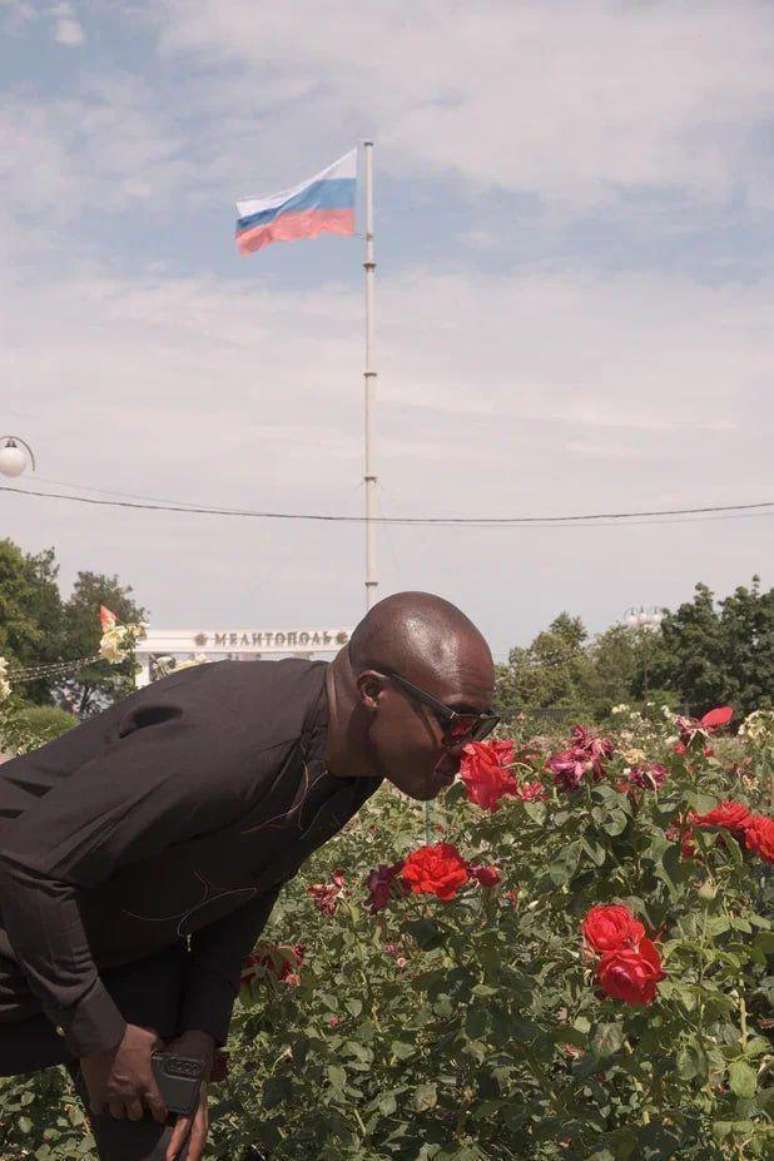
In May, the African Initiative had already organized a separate “press tour” in Mariupol, aimed at a delegation of Malian bloggers.
Press trips for journalists organized by various countries are a well-known tool for trying to sell a nation’s views.
But while “the Western media does a lot of progressive education [para jornalistas] To report on important issues that have become global concerns, Russia uses these guided tours as a way to spread certain narratives,” says Beverly Ochieng, an analyst at the consultancy Control Risks and the Center for Strategic and International Studies (CSIS), noting that China is pursuing similar initiatives.
Having African journalists chronicle their travels gives “an impression of authenticity” because “they reach audiences with language they recognize” and do not appear to be part of “a broader campaign used to portray Russia in a positive light,” Ochieng explains.
In articles published after the trip, African journalists refer to Ukrainian cities occupied by Russian forces as “Russian conflict zones” – and quote Russian-installed officials, echoing Russian state propaganda and presenting the Kremlin’s view of Russia and Ukraine’s borders.
In an article published on JoyOnline, an English-language website run by the Multimedia Group, Ghanaian journalist Ivy Setordjie argues that the Ukrainian region of Zaporizhzhia [cuja capital está sob controle ucraniano] is “located in the south of European Russia”.
He told the BBC he disagreed that the regions were illegally annexed by Russia, saying his reporting reflected his own judgment – and was “not biased” towards the country.
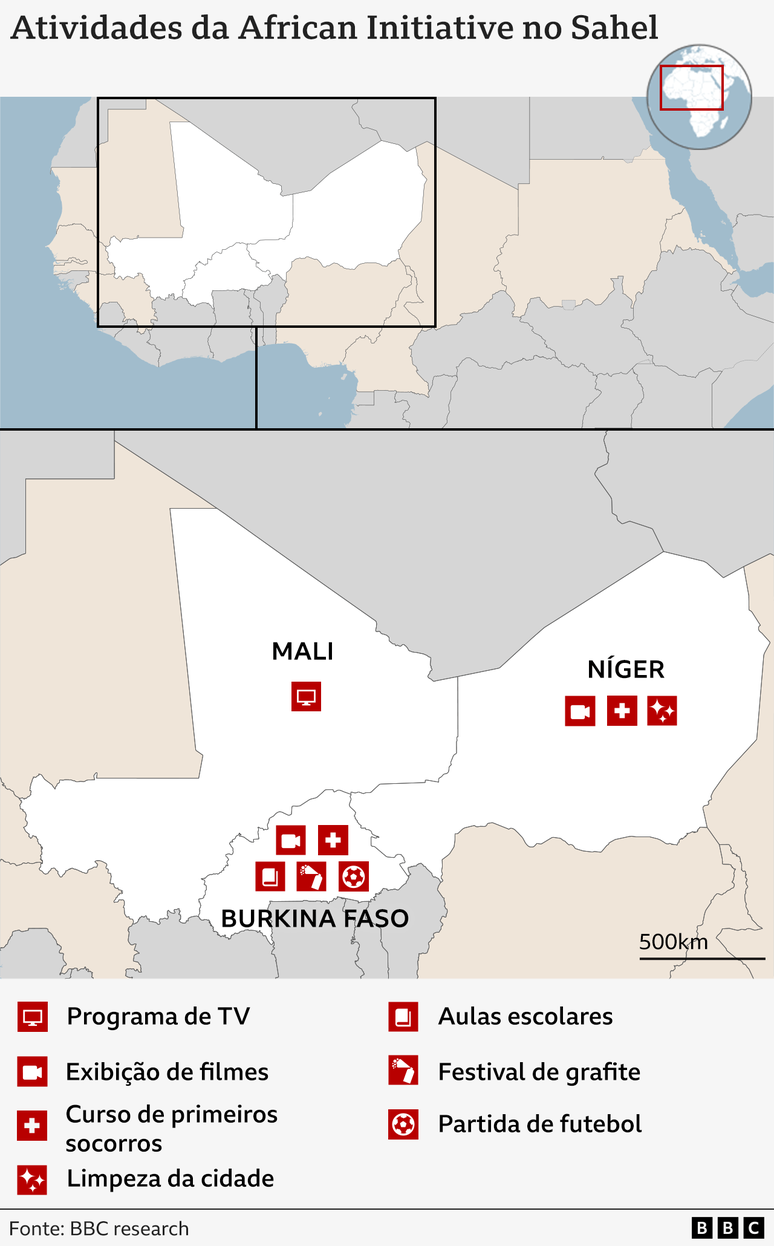
Martial Arts and Graffiti
In addition to media “press tours,” local affiliates of the African Initiative in the Sahel have been actively involved in community outreach efforts aimed at promoting Russia’s image in the region.
The BBC monitors the Africa Initiative’s Telegram channels and Facebook pages, where it shares videos, images and reports of its local work.
In Burkina Faso, we found evidence of a football tournament where the Russian national anthem was played; “friendship courses” in schools, where students learned about Russia; a competition in “sambo,” a Soviet martial art; first aid courses for citizens and police officers; and a graffiti festival, where participants drew Russian President Vladimir Putin along with Thomas Sankara, former leader of Burkina Faso. All events were sponsored by the African Initiative.
The footage also shows members of the African Initiative distributing supplies to local residents and showing the documentary in neighborhoods. touristabout a group of Wagner instructors in the Central African Republic.
Who is behind the African Initiative?
“The original idea with the Africa Corps was to erase all the military structures that Prigozhin had developed and replace them with something new. The Africa Initiative, which often served as a media arm, was more accommodating and was happy to reuse all the resources that already existed,” explains Czerep, of the Polish Institute for International Relations.
According to him, an important role in the new organization will be played by the Russian federal security agency, the FSB. The director and editor-in-chief of the African Initiative is Artyom Kureyev, identified by Russian experts as a Russian security agent. Kureyev is linked to the Valdai Club, a Moscow-based think tank close to Putin.
The African Initiative’s website lists Anna Zamaraeva, Wagner’s former press secretary, as its deputy editor-in-chief.
Viktor Lukovenko, known as one of Prigozhin’s “political technologists,” founded the African Initiative office in Burkina Faso but resigned in recent months. A former Russian nationalist with a criminal past, Lukovenko served five years in prison for an attack in Moscow on a Swiss citizen who later died.
We contacted the African Initiative for comment on this report. The Moscow office confirmed receipt of our questions, but responses were not forthcoming by email. The African Initiative responded to the BBC report in an article on its website, citing a response it said it had sent to the BBC.
The organization said that its “humanitarian activities in the Sahel, such as the football championship” were aimed at “improving Russian football and recruiting new players” and that the purpose of the film screenings and school lectures is to introduce African people to “the great Russian culture.”
The organization reiterated and defended the stories that the BBC had called misleading, but did not provide any new evidence. It cited the Russian constitution and Russian laws as justification for its terminology when referring to areas of occupied Ukraine as Russian territory.
In February, in response to a U.S. State Department report, an article published on the African Initiative website stated that its editorial board “insists that its purpose is to spread knowledge about Africa in Russia and to popularize Russia in African countries.” The intention, they say, is to give “a variety of Africans the opportunity to be heard, including their criticism of Western countries.”
Meanwhile, the organization continues to increase its presence in the Sahel. In the last week of August, about 100 students from Burkina Faso attended a conference on training opportunities in Russia.
“I learned about the culture of Russia and the relationship between our governments,” a smiling teenager wearing a T-shirt with the African Initiative logo said in a video recorded after the discussion.
Update September 12: This article has been updated with comments from the Africa Initiative
Source: Terra
Rose James is a Gossipify movie and series reviewer known for her in-depth analysis and unique perspective on the latest releases. With a background in film studies, she provides engaging and informative reviews, and keeps readers up to date with industry trends and emerging talents.

